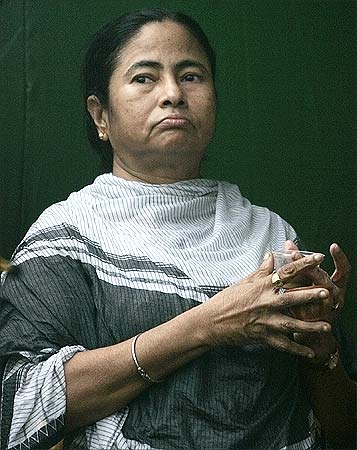
Railway Minister Mamata Banerjee, it appears, is peeved with Finance Minister Pranab Mukherjee and Home Minister P Chidambaram over the punishment being meted out to government servants on charges of corruption.
At a meeting of the Group of Ministers on Corruption recently, Mamata was in top form. While she agreed with the home minister's view on government employees being targetted for corruption, she wanted a background paper on the issue.
The railway minister also sounded a word of caution, saying that while amending laws relating to tackling corruption it was necessary to ensure that the fundamental rights of government servants and citizens were duly protected.
The panel is also learnt to have discussed the possibility of amending Article 311 of the Constitution to provide for summary proceedings in case of grave misdemeanour or blatant corruption by public servants.
This correspondent has the 32-page secret note of the first GoM meeting on tackling the menace of corruption, where the reference to Mamata Banerjee remarks is available.
. . .

Union ministers hardly have any discretionary powers that can be grossly misused and bracketed in the category of 'corruption'. At least, that is the position on paper as revealed in an 8-page document prepared by the ministries for urgent government action!
The document, listing 32 such small discretionary powers enjoyed by 14 ministers, was examined on Monday by the GoM on Corruption, headed by Finance Minister Pranab Mukherjee, as part of its terms for relinquishing all discretionary powers.
As a member of the GoM noted after the meeting, "These are the discretionary powers conceptualised for public good and it would be foolish if the ministers are not allowed to extend a helping hand to the deserving and needy persons by extinguishing such powers."
The whole issue of the discretionary powers was brought into focus by Congress president and United Progressive Alliance chairperson Sonia Gandhi at the party's plenary in New Delhi in December in the context of Mumbai's Adarsh Housing Society scam where the Maharashtra chief minister and other ministers allegedly exercised discretionary powers that were questionable.
. . .
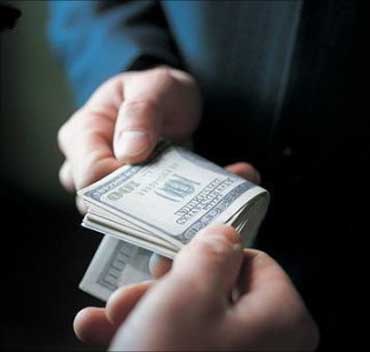
The Congress president wanted that ministers should have no discretionary powers as such powers lead to partisanship and corruption. Yet, it is an open secret that ministers hardly need any special powers to take decisions and make bureaucrats dance to their tune.
Department of Personnel and Training had last month written to all ministries asking them to provide details of discretionary powers enjoyed by the ministers.
It had also sought details of the instances in which such powers were used by the ministers and senior functionaries of the ministries.
As for the discretionary powers, the home minister enjoys the most, seven, discretionary powers, followed by the tribal affairs minister with five, the railway minister with four, and the tourism, telecom and external affairs ministers with two each.
Click NEXT to check out which minister has what discretionary powers. . .

Agriculture Minister: The agriculture minister has powers to appoint the government nominees in cooperative organisations, like NAFED and managing committees such as NIAM and SFAC, and nominate non-officials on autonomous institutions like Coconut Development Board, National Horticulture Board and Joint Hindi Advisory Committee.
Minister for Fertilisers: The minister for fertilisers has the power to appoint personal staff and two farmers' representatives to the fertiliser advisory forum.
Telecom Minister: The telecom minister has the discretion to nominate members of the Telephone Advisory Committee, and approve issue of stamps on dignitaries (subject to guidelines and annual stamp issue programme).
The minister of state for telecom can also sanction out-of-turn telephone connections. But then who needs these connections in today's day and age when mobile phone connections are easily available?
. . .
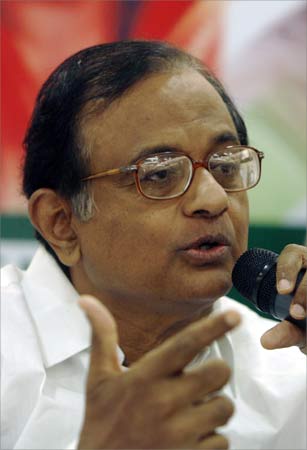
Home Minister: Now look at the discretionary powers that the home minister enjoys:
. . .
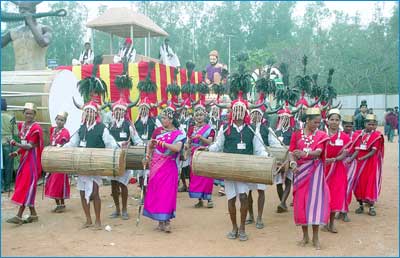
Tribal Affairs Minister: The tribal affairs minister has the second highest discretions on five grounds:
. . .

Railway Minister: The railway minister can grant concession on requests besides those permissible under the tariff, grant enhanced ex-gratia to victims of train accidents, issue complementary card and cheque passes to persons and organisations engaged in social, cultural, educational, sports and welfare activities as also on welfare grounds and she can also nominate chairmen and members of the passenger amenities committee and passenger services committee.
External Affairs Minister: The external affairs minister has the discretion to grant diplomatic passport under Category 'F' and allot a portion of Haj seats.
. . .
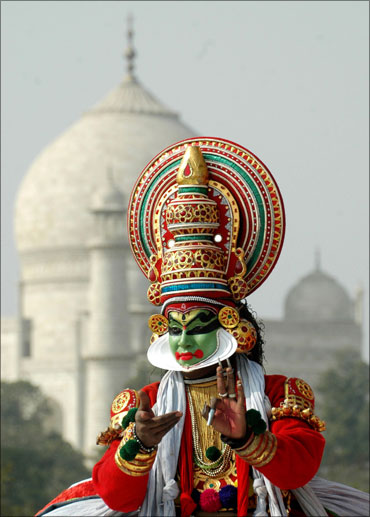
Tourism Minister: The tourism minister has the powers to nominate members on various advisory committees and boards of autonomous institutions and approve central financial assistance priority to projects.
Commerce Minister: The commerce minister enjoys powers to select any officer from the panel sent by Civil Services Board.
HRD Minister: The human resources development minister has no discretionary powers in admissions and appointments in schools or colleges but has a discretionary fund of Rs 4 lakh (Rs 400,000) a year for providing financial assistance for cases of hardship.
. . .
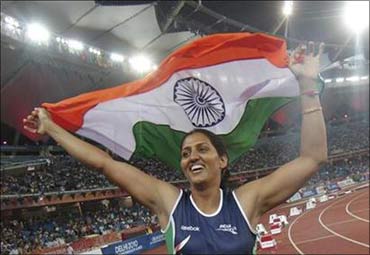
Minister for Mines: As regards the minister for mines, the document says the Mines and Minerals Bill is being brought to Parliament for minimising discretionary powers of the minister.
Steel Minister: The steel minister does not have discretionary powers, but as chairman of Steel Consumers Council, he directly nominates some 400 non-official members.
Sports Minister: There is only one scheme of National Welfare Fund for sportspersons in which the sports minister has the discretion to sanction assistance in deserving cases even to those who technically are non-eligible, depending upon facts and circumstances of each case. He also has the discretion to decide quantum of assistance.